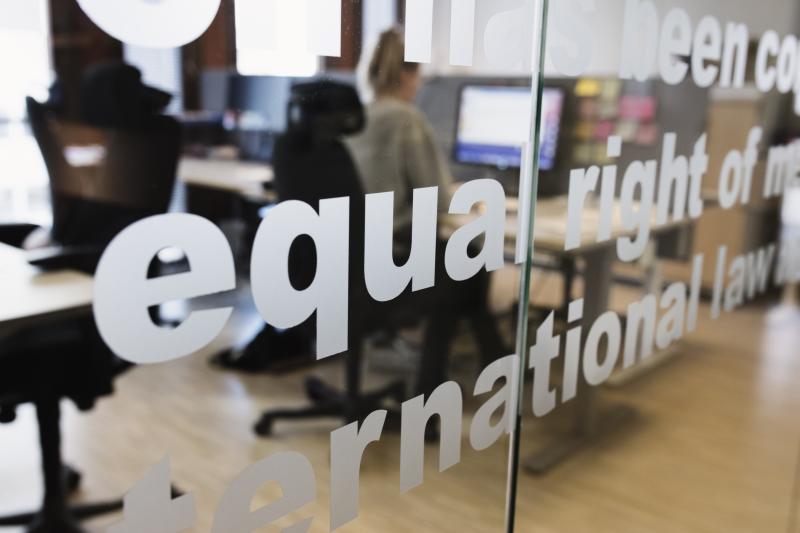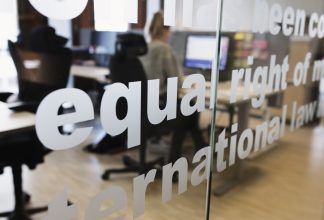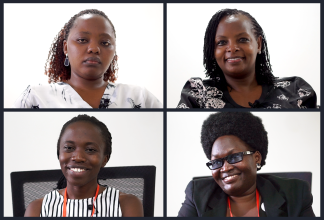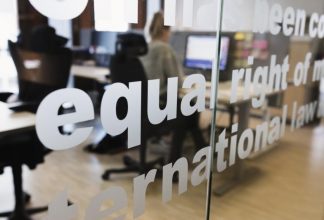Civil Rights Defenders seeking consultants: assessment of major impacts of conflict on human rights organisations and human rights defenders

Civil Rights Defenders and the Ethiopian Human Rights Defenders Centre are partnering to conduct an independent assessment. We are looking for experienced consultants to conduct an assessment of the major impacts of the conflict on human rights organisations and human rights defenders in the north of Ethiopia. Please read ‘Terms of Reference’ below.
TERMS OF REFERENCE
ASSESSMENT OF THE IMPACT OF CONFLICT ON HUMAN RIGHTS ORGANIZATIONS AND HUMAN RIGHTS DEFENDERS IN ETHIOPIA
Contracting Party: Civil Rights Defenders
Reports to: Aklile Solomon, Africa Department
Project: Resilience and Protection for Human Rights Work in Ethiopia
1. BACKGROUND
1.1 ABOUT CIVIL RIGHTS DEFENDERS
Civil Rights Defenders is an international human rights organisation based in Stockholm, Sweden, that partners with and supports human rights defenders (HRDs) globally. It has extensive experience in supporting HRDs most at risk. Civil Rights Defenders working through flexible, context sensitive and, when needed rapid interventions to support local actors who are at the core of ensuring the respect of human rights.
Civil Rights Defenders works in the Africa region with the same mission of partnering with local HRDs and civil society to support local efforts that promote and defend human rights in the region. Civil Rights Defenders works closely with its local partners to create enabling internal capacity and external environment that ensure their continued presence and the impact of their work.
Civil Rights Defenders is an expert organisation that partners with and supports human rights defenders (HRDs) globally. We have extensive experience in supporting HRDs by working through flexible, context-sensitive, and, when needed, fast interventions in order to support local actors who are at the core of ensuring respect for human rights. Our vision is a world of democratic societies in which we all enjoy our civil and political rights.
Civil Rights Defenders works in the Africa region through close collaboration with local HRDs and civil society to support local efforts that promote and defend human rights in the region. We work to create an enabling internal capacity (skills, knowledge, and resources) and external environment that ensure the continued presence and the impact of their work.
Civil Rights Defenders has been partnering and working with local civil society organizations in Ethiopia with the aim of enhancing the role of human rights organizations and human rights defenders for an impactful participation in the protection and promotion of Human Rights in Ethiopia. With this objective, the project aims at contributing to create enabling environment for human rights work through increasing safety and organisational capacity of HRDs.
1.2 ABOUT ETHIOPIAN HUMAN RIGHTS DEFENDERS CENTER
The Ethiopian Human Rights Defenders Center (EHRDC) was established in December 2019, driven by the collective vision of human rights defenders (HRDs) and human rights organizations to create a strong national network of HRDs. Officially registered under the FDRE Authority for Civil Society Organizations under registry number 5220 in November 2020, and has dedicated its efforts to building the capacity, ensuring the safety, security, and wellbeing of HRDs, and providing them with the necessary tools and support to carry out their crucial work. The Center aims to establish a strong national human rights defenders’ network that protects, builds capacity, and advocates for Human Rights Defenders (HRDs) through its 3 pillars/intervention, i.e., capacity building, advocacy, and protection.
Since its establishment, EHRDC has been continuously engaging with HRDs and CSOs to enhance their capacity by conducting several capacity-building trainings on the issues of gender integration into programs, digital and physical security, Psychological first aid and wellbeing, basic human rights and gender, evidence-based advocacy, International and Regional protection, and human rights mechanisms. Hitherto, EHRDC conducted comprehensive training programs for over 600 HRDs that are located in different regions of Ethiopia, equipping them with the knowledge and skills to navigate the complex and often perilous landscape of human rights advocacy. These trainings have covered essential topics such as risk assessment, physical and digital security, international advocacy, and basic human rights principles. Likewise, our organization has engaged in advocating and promoting HRDs using youth voices throughout the country by establishing Human Rights Clubs and providing training in different public universities (12 universities so far) to promote human rights and a culture of peaceful dialogue by fostering a new generation of HRDs equipped with the knowledge and skills to advocate for human rights. Moreover, for effective intervention through capacity building or advocacy or protection, the center has conducted research on the HRD situation and conflict-related sexual violence and continued producing quarterly assessments on the situation of HRDs in Ethiopia since 2022 to advocate and promote the HRD situation in its program.
On the other note, in our protection area of intervention, EHRDC provided crucial protection for around 40 HRDs and journalists recognizing the inherent risks associated with their work from state and non-state actors. The protection is provided through various means and stages of protection mechanisms or tools including protection grants.
In addition, we are a secretariat of the Ethiopian Women Human Rights Defenders Network (EWHRDN) and Ethiopian Human Rights Defenders with Disabilities Network (EHRDDN) that are established to tackle the intersectional challenges they encounter including being WHRDs and PWDs in Ethiopia.
2. CONTEXTUAL BACKGROUND
Ethiopia has experienced several internal conflicts throughout its history. The fragile peace and stability in the country has been exacerbating in the last few years including a devastating internal war in northern and western Ethiopia. The war that started in Tigray region on 03 November 2020 expanded to neighbouring regions of Afar and Amhara.
This war in Tigray and neighbouring regions, among other things, has caused gross human rights violations and extreme humanitarian crisis the extent of which remains to be determined. The war has disproportionately affected women and girls in the region – sexual violence and rape were used as a tool throughout the conflict by all warring parties according to several independent reports.
A peace agreement between the Federal Government and Tigray Peoples Liberation Front (TPLF) was signed on 02 November 2022. The Pretoria agreement brought hope of peace in the region, and it was expected to be a step towards stability in the country. However, a subsequent conflict that has been occurring in the Amhara region has been a step back in that process.
This continuous instability, especially the war in the north, had significant impact on the civic space in the country. Restriction on freedom of expression, restriction on access to information, restriction on freedom of movement and increased threats on civil society organizations (CSOs) are among the challenges affecting CSOs. The challenge had a different dynamic for CSOs and HRDs in the war affected regions. In addition to experiencing the impact of the war directly, CSOs and HRDs in the region were almost rendered non-existent. They have been forced to deal with the impact of the war including through the provision of humanitarian service which has caused extensive psychosocial trauma.
The full impact of the war on the civil society and how the civic space had to change/adopt to the realities remains to be studied. The peace agreement has created some access to the region including for civil society organizations. These engagements coupled with scattered information gathered in different ways have provided some insight into the status of CSOs. However, there is still a need for a comprehensive assessment with the objective of identifying HROs/HRDs in the region and the support they require.
3. DESCRIPTION AND OBJECTIVE OF THE ASSIGNMENT
Civil Rights Defenders and the Ethiopian Human Rights Defenders Centre are partnering to conduct an independent assessment on major impacts of the conflict on human rights organisations and HRDs in the north of Ethiopia (Afar, Amhara and Tigray region). is looking for experienced consultants to conduct an assessment on the impact of the war on human rights organizations and HRDs. The assessment will focus on Amhara, Afar and Tigray as regions directly affected by the war.
The objective of the assignment is to conduct an assessment on the impact of the war on the civic space more specifically its impact on human rights organizations and human rights defenders. The assessment will, among other things, identify:
- The impact of the war on human rights organizations and HRDs
- The number of organizations that sustained and the way they sustained themselves through the war.
- The challenges they had before the conflict and the challenges that emerged because of the war.
- The challenges they foresee in continuing their work as HROs and HRDs
- The strategic support needed for HROs and HRDs to revive.
4. SCOPE OF WORK AND EXPECTED DELIVERABLES
a) The consultants are expected to conduct the assessment to meet the objectives listed above. The deliverables include:
b) Inception Report: understanding of the assignment, detailed methodology including data collection tools and timeline for the assessment.
c) Conduct assessment in the three regions identified including list of HROs and HRDs and strategic recommendation for civil rights defenders as well as other organizations that want to support the civic space in the region.
d) Present a draft to civil rights defenders for detailed feedback.
e) Present the findings of the assessment on a validation workshop organized by Civil Rights Defenders
f) Incorporate all feedback from stakeholders on the validation workshop as well as civil rights defenders.
g) Present a finalized assessment to civil rights defenders.
5. DURATION OF WORK
The assignment will be conducted for 40 Days from 01 December 2023- 20 January 2024 tentatively as follows:
- 5 days to prepare and present an Inception report.
- 20 days to conduct the assessment.
- 2 days to incorporate feedback from civil rights defenders.
- 1 day to present findings on a validation workshop.
- 2 days to incorporate feedback from the validation workshop.
6. REQUIRED EXPERTISE AND QUALIFICATIONS
6.1 Required Qualifications
- Extensive knowledge on human rights law, practice and jurisprudence is required.
- Knowledge and understanding of the civic space in Ethiopia especially the context of human rights organizations and HRDs is required. Experience of working with human rights defenders, CSOs and local communities in Ethiopia. Experience of working with women human rights defenders or marginalized communities is considered an asset.
- Deep knowledge and understanding of gender in the country including the women, peace, and security agenda, how gender intersects with human rights organizations and how women HRDs are affected is necessary.
- A demonstrated experience in quantitative and qualitative research is required.
- Understanding of gender and security as well as gendered threats with Women Human Rights Defenders.
6.2 Preferred qualifications
- Strong communication and presentation skills.
- Strong organizational and time management abilities.
6.3 Ethical consideration
- An understanding and strict adherence to all human rights principles provided in international instruments and jurisprudence is mandatory.
- An understanding of the unjustness of inequality (whether based on gender, class, ethnicity, citizenship, economic status, etc.) and a commitment to strive for social change towards equity and justice.
- A strict adherence to impartiality and independence is required when conducting this assessment.
7. PAYMENT SCHEDULE
The consultants will receive 20 %of the total payment upon signing the consultancy agreement, and additional 20% after submitting the final draft for the validation and the remaining amount (60 % of the total payment) upon the completion of all deliverables and approved by civil rights defenders.
8. APPLICATION
Interested applicants should send the following documents to Africa@crd.org by 15 December 2023. Applicants should use the phrase “Conflict Impact Assessment” profile (max. 1 page for individuals) focusing on what makes the applicant the right person/organisation for the work.
- CV and Relevant experience of those that will be involved in the project.
- Proposal that, among others, shows how the consultants understand and operationalise the work (methodology), outline of the activities involved against deliverables, timelines, and potential risks.
- Financial proposal
9. CRITERIA FOR SELECTION
Selection will fully be based upon the proposal submitted by the applicant. The technical proposal will be 70 percent and the financial proposal will have 30 percent weight.
Evaluation: Technical proposal (70 percent)
- Applicant Qualification (30 percent)
- Qualification of those involved in the project (10 %)
- Knowledge and experience on conducting assessments (20 %)
- Proposed Methodology (40 percent)
- Technical understanding of the scope of the work, proposed methodology and timelines for deliverables (40%)
- Financial proposal (30%)
- The best offer made and consideration of best value for money will be used in the financial evaluation.


